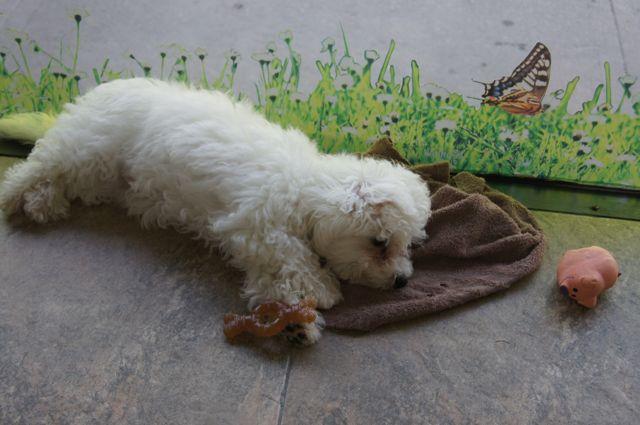Buying a Puppy: What You Should Consider
- Wednesday, 17 July 2013 22:07
- Last Updated: Wednesday, 17 July 2013 22:17
- Published: Wednesday, 17 July 2013 22:07
- Hits: 5371
 The opening of Scarsdale Puppy Shop on Weaver Street has made the issue of puppy mills and stores that buy from them a hot button issue again for area residents. In an effort to learn more about the puppies at Scarsdale Puppy Shop, we contacted the owner for some answers. We wanted to know, among other things, where the puppies came from, what happens to the unsold ones, and had he visited the breeding facilities. Despite a request for a sit-down, the owner informed us that on advice of counsel, he would not speak with anyone from Scarsdale10583.com. This begs the question: What is there to hide?
The opening of Scarsdale Puppy Shop on Weaver Street has made the issue of puppy mills and stores that buy from them a hot button issue again for area residents. In an effort to learn more about the puppies at Scarsdale Puppy Shop, we contacted the owner for some answers. We wanted to know, among other things, where the puppies came from, what happens to the unsold ones, and had he visited the breeding facilities. Despite a request for a sit-down, the owner informed us that on advice of counsel, he would not speak with anyone from Scarsdale10583.com. This begs the question: What is there to hide?
If you are considering buying from a puppy store or any other facility in the area, think about the following before you make your purchase.
1. Look at rescue organizations, animal welfare centers and reputable breeders first. Reputable breeders (as opposed to a commercial breeding entity) that breed responsibility with an animal's health and welfare in mind will insist on meeting prospective families face to face or, in this era of modern technology, Skype as an alternative if distance is a factor. A good breeder will ask for personal references and want pictures of your home and yard. If you are going to lay out $1,000 or more for a new family addition, wouldn't you want to know how many litters the breeder has bred and whether or not the sire and dam have been tested for heredity diseases? Bottom line: A reputable breeder won't sell to a store that sells puppies. No, never, end of story. Check out rescue organizations. There is a rescue group for practically every breed at every stage of life. You get to meet the animal many times on more than one occasion and spend time together to see if you are good match for each other. Plus you get the added bonus that the people who run rescue organizations are passionate about the animals under their care and know the animal's temperament well, helping to ensure that your new addition will fit in well with your family now -- and in the future.
2. No, you aren't saving a life if you buy from a store that sells puppies. Ever think what happens to the puppies that are not sold and are past the age of being "adorable?" The owner can't take home every unsold dog. In most cases, unsold puppies are returned to puppy brokers and then sent back to the puppy mills, where they are caged and forced to reproduce. In other cases unsold pets are dumped at local animal shelters where, if not adopted in a short time frame, they are euthanized. So, if you honestly believe you are doing some good by "rescuing" a puppy/dog/kitten/cat from a pet shop window, think again. Your money keeps the cycle alive and pumping out animals.
3. Don't think because NY State regulates pet dealers this ensures puppies have humane conditions in which to live. Consider this fact: the New York State Department of Agriculture and Markets (DAM) regulates pet dealers. According to the department's website, DAM's budget for 2011-12 was $166 million with $117,000 of that budget used to fund the division responsible for regulating pet stores. That division has one inspector for New York State covering 267 licensed pet stores. As a result, not enough funds and manpower are in place at the state level to regulate the operation of pet stores. New York is a big state – how could one inspector possibly make a difference?
4. A USDA license means almost nothing. According to Cori Menkin, senior director of ASPCA's Puppy Mills Campaign, "Consumers need to know that they should not be falsely reassured when a pet store tells them their puppies come from USDA licensed breeders." According to Menkin, "Unfortunately, USDA standards alone do not ensure that dogs are raised humanely in an environment in which they can thrive." If you are even considering buying from a pet store, check out ASPCA's http://nopetstorepuppies.com and see if you still feel the need to make a purchase at a pet store. Many of the photos on the website depict conditions commonly found in mills. The photos show not only conditions that violate federal law, but also conditions that are legal but that the ASPCA and the general public consider inhumane. The new database aims to educate consumers about where pet store puppies really come from by showing them what it looks like inside many USDA licensed facilities.
To write a balanced article, I wanted to include information on why buying from a puppy store is beneficial for the animals and their future families. The only argument I could come up with is that it is convenient. Drive up, park, pull out the plastic and drive away with your new best friend. Though I am sure that the puppies in Scarsdale Puppy Shop are well cared for and given the best available care, I believe the public has the right to know the true story behind those puppies in the window.







